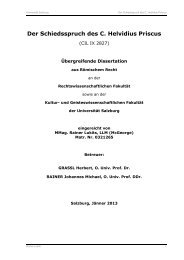(post) Keck Case Law on the Freedom to Provide Services
(post) Keck Case Law on the Freedom to Provide Services
(post) Keck Case Law on the Freedom to Provide Services
You also want an ePaper? Increase the reach of your titles
YUMPU automatically turns print PDFs into web optimized ePapers that Google loves.
States and was subject <strong>to</strong> nati<strong>on</strong>al selling arrangement rules. Instead, <strong>the</strong> Italian andSwedish rules prevented <strong>the</strong> producer from having a real opportunity <strong>to</strong> put <strong>the</strong> product <strong>on</strong><strong>the</strong> market of a Member State in <strong>the</strong> first place. The category of certain sellingarrangements is thus not useful in this c<strong>on</strong>text. 51Instead of using <strong>the</strong> <str<strong>on</strong>g>Keck</str<strong>on</strong>g>-criteria, I suggest that both cases have <strong>to</strong> be interpreted in <strong>the</strong>light of <strong>the</strong> original meaning of Art 34 TFEU and <strong>the</strong> Cassis principle of mutualrecogniti<strong>on</strong>. First, <strong>the</strong> <strong>to</strong>tal ban of <strong>the</strong> sale of a product – or <strong>the</strong> restricti<strong>on</strong> of its use, whichhas <strong>the</strong> same effect – comes much closer <strong>to</strong> <strong>the</strong> original meaning of Art 34 TFEU as aquantitative import restricti<strong>on</strong> than many cases c<strong>on</strong>cerning product requirements, forexample, package requirements. If measures that merely require <strong>the</strong> adaptati<strong>on</strong> of aproduct c<strong>on</strong>stitute restricti<strong>on</strong>s, <strong>the</strong>n surely measures having <strong>the</strong> effect of banning <strong>the</strong> saleof a product must also be regarded as restricti<strong>on</strong>s. According <strong>to</strong> <strong>the</strong> Cassis principle aMember State has <strong>to</strong> recognise a product that has been lawfully produced in ano<strong>the</strong>rMember State. This also means that <strong>the</strong> Member State is prohibited from banning <strong>the</strong> saleof such a product or restricting its use in a way that equals a ban. The producing MemberState is, in principle, <strong>the</strong> sole regula<strong>to</strong>r of <strong>the</strong> lawfulness of a product. This is because <strong>the</strong>lawfulness bel<strong>on</strong>gs <strong>to</strong> <strong>the</strong> producti<strong>on</strong> stage of a product, as do o<strong>the</strong>r regulati<strong>on</strong>s aboutproduct requirements. This is also true for a restricti<strong>on</strong> <strong>on</strong> use which equals an ec<strong>on</strong>omicban of <strong>the</strong> sale of <strong>the</strong> product because, in effect, it also c<strong>on</strong>cerns <strong>the</strong> lawfulness of <strong>the</strong>51See <str<strong>on</strong>g>Case</str<strong>on</strong>g> C-110/05, Commissi<strong>on</strong> v. Italy (trailers), [2009] ECR I-519, paras. 41-42 and <str<strong>on</strong>g>Case</str<strong>on</strong>g> C-142/05,Mickelss<strong>on</strong> and Roos, [2009] ECR I-4273, paras. 25-27.16




